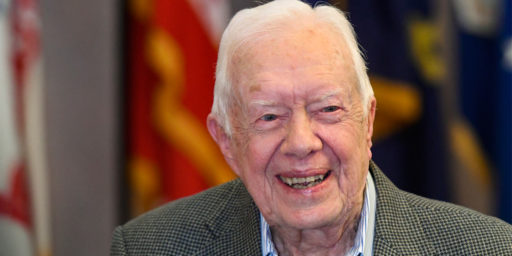SHARPTON: MISSION ACCOMPLISHED
RealClear Politics has an interesting commentary on the Al Sharpton campaign.
Only in America can a person with no political experience and no qualifications declare themselves a candidate for President of the United States and then use an utterly quixotic campaign to rehabilitate a tarnished reputation. That’s essentially what Al Sharpton has done in just a few short months.
You’ll remember back in January when Sharpton made his run official, former Gore campaign manager Donna Brazile tried mounting a “favorite son” campaign against him. The plan called for fielding African-American candidates in key primary states to try and dilute Sharpton’s potential influence on the primary process. Clearly, despite the entry of Carol Moseley-Braun into the race shortly afterward, the plan hasn’t worked.
Despite reports that his campaign in South Carolina is “a mess,” Sharpton is pulling 11% of the vote there, tied for third place with John Edwards and well within striking distance of both Wes Clark and leader Howard Dean. He also continues to poll respectably in New York (8.5% average in last 2 polls), Virginia (6%), Georgia (5.6%) , and Ohio (6%).
National polls are meaningless to legitimate candidates because they have zero effect on the nominating process. But for fringe candidates like Sharpton who don’t have a prayer of winning and whose only concern is a personalized seat at the table of political power, national polls are a barometer by which they can measure – and leverage – their influence in the party. The bigger Sharpton’s national numbers get the more he’s seen as representing an important constituency, the more coveted his endorsement becomes, and the more the eventual nominee has to promise him in return in return for that endorsement.
In that respect, nobody is benefiting more from John Kerry’s demise than Sharpton. He’s out-polled Kerry in three of the four latest national polls and is running, on average, 2-points ahead of John Edwards. The man who gave us the Tawana Brawley hoax and the riot at Freddy’s Fashion Mart is, in the eyes of some Democratic voters, more qualified to be President than two sitting United States Senators. How’s that for creating an image of legitimacy?
Sharpton has managed to do exactly what many Democrats feared most. He’s inserted himself into the middle of the biggest, most important fight of the Democratic party and turned himself into the political version of Don King; a flamboyant, entertaining, spotlight hugging self-promoter. Weeks before the first vote has been cast, Al Sharpton’s mission is already accomplished. (Many links in original.)
Of course, winning the presidency–let alone a party nomination–is not strictly about resume. Indeed, with the exception of George H.W. Bush in 1988, I can’t think of an example of the most qualified non-incumbent (a sitting president is, by definition, more experienced at the things a president does than any outsider) winning the race in the last 30 years.
1976: Carter (Small state governor with no foreign policy experience) over Ford (Sitting president, VP, House Minority Leader)
1980: Reagan (Large state governor with little foreign policy experience) over Carter (Sitting president)
1984: Reagan re-elected over Mondale (VP)
1988: Bush I (VP, etc.) over Dukakis (Governor with no foreign policy experience)
1992: Clinton (Small state governor with no foreign policy experience) over Bush (Sitting president, VP, etc.)
1996: Clinton re-elected over Dole (Senate Majority Leader)
2000: Bush II (Large state governor with little foreign policy experience) over Gore (VP)
Indeed, in the cases where an incumbent president didn’t win, the winner was generally not the most experienced contender for the party nomination:
1976: Henry “Scoop” Jackson, Mo Udall, and others had more experience than Carter.
1980: George H.W. Bush was arguably more qualified than Reagan.
1988: Bush, with 8 years as VP under his belt, is a notable exception.
1992: Clinton won over a weak field, but Jerry Brown and Paul Tsongas were arguably more qualified.
2000: McCain was likely more qualified than Bush II–certainly in terms of foreign policy.






Jerry Brown. *shudders in horror*